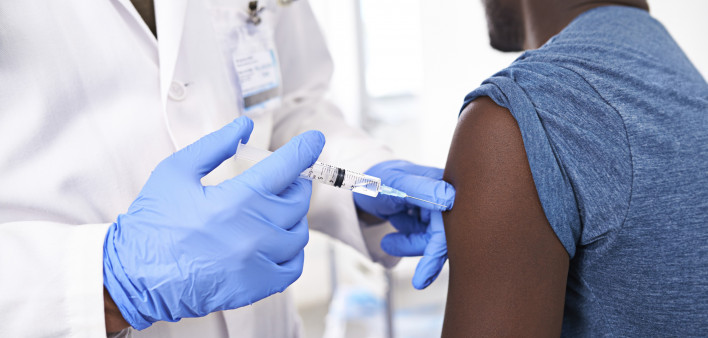All adults younger than 60 should be vaccinated against hepatitis B virus, recommends an advisory panel at the Centers for Disease Control and Prevention (CDC). As The Associated Press reports, the CDC’s director, Rochelle Walensky MD, MPH, must approve the recommendation before it becomes public policy.
Hepatitis refers to inflammation of the liver, an organ that acts as the body’s filtration system. Hepatitis B can be chronic, and over years or decades, it can lead to severe liver complications, including cirrhosis (scarring of the liver), liver cancer and the need for a liver transplant.
Hepatitis B vaccinations became a standard recommendation for children beginning in 1991, which means that most adults born in the United States and younger than 30 years old are already vaccinated.
“On behalf of The Hepatitis B Foundation, I want to thank the [advisory panel] for this life-saving recommendation,” said Michaela Jackson, MS, MPH, prevention policy manager at the Hepatitis B Foundation, in a statement about the panel’s recommendation. “It has been frustrating to watch rates of infection rise when we know that there is a safe and effective vaccine that can prevent hepatitis B and liver cancer. This recommendation will help remedy a very significant health inequity for marginalized groups and it will serve to make many adults in the U.S. safer. Individuals who are not included in the updated recommendations can still receive the hepatitis B vaccine if they wish.”
The Hepatitis B Foundation noted that the "updated recommendation will go a long way towards improving vaccination rates and protecting adults in the U.S. (currently only 30% of U.S. adults are vaccinated). However, it is very disappointing that the recommendation is not as inclusive as it could have been. Data show that many people over age 59 are at risk for hepatitis B infection, and less than 20% of older adults with risk factors are vaccinated.”
News Release: Landmark vote by @CDCgov ’s Advisory Committee on Immunization Practices (ACIP) to recommend universal #hepatitisB vaccination. Read the story here: https://t.co/eClOjDyXtu #HBV #hepB #nohep pic.twitter.com/jEPyCra8YV
— Hep B Foundation (@HepBFoundation) November 4, 2021
Before this week’s updated recommendation by the CDC’s Advisory Committee on Immunization Practices, the CDC guidelines advised adults to get vaccinated against hep B if they were in risk groups, such as people who inject drugs or people who have multiple sex partners.
It’s estimated that about 20,000 people contract hep B each year in the United States, reports the AP. Diagnoses have been increasing among adults in their 40s and 50s, and upticks have been linked to the opioid epidemic and injection drug use.
In order to bring this number down and meet the federal goal of ending viral hepatitis by 2030, the advisory committee updated its recommendations.
“We’re losing ground. We cannot eliminate hepatitis B in the U.S. without a new approach,” Mark Weng, MD, MSc, an epidemiologist and pediatrician with the CDC, told the AP.
The Hep Basics section titled Hepatitis B Transmission and Risk states:
Hepatitis B virus (HBV) is highly contagious and may be present in blood and body fluids, including semen and vaginal secretions. The saliva of people with hep B may contain evidence of the virus but in such small concentrations that kissing does not spread HBV. Here are the most common ways hepatitis B is transmitted:
- Sex with an infected partner
- Acquired at birth from an infected mother
- Sharing injection drug equipment (including needles, syringes, cookers, drug-preparation equipment)
- Contact with blood or open sores of an infected person
- Needlestick or other skin puncture
- Sharing items such as glucose monitors, razors or toothbrushes with an infected person.
Hepatitis B may also be spread through non-injection drug use (for example, via cocaine straws and crack pipes) as a result of exposure to blood. An unsterilized instrument may transmit HBV during acupuncture, tattooing and body piercing. A human bite may spread hepatitis B.
Hep B is not spread through food or water, sharing eating utensils, breastfeeding, hugging, kissing, hand holding, coughing or sneezing.
HBV may live outside the body for at least seven days and still be potentially infectious.
About 1.9 million Americans are estimated to be living with hep B. Many of them are unaware of their status because they’re not experiencing symptoms associated with liver damage. According to the World Hepatitis Alliance, hepatitis B and C kill more people annually than HIV/AIDS. It also kills more people than tuberculosis and malaria. What’s more, globally, hep B and C cause two out of three liver cancer deaths.
There are five main types of hepatitis viruses. The most common are hepatitis A virus (HAV), hepatitis B virus (HBV) and hepatitis C virus (HCV), followed by hep D (which infects only people who have hep B) and hep E.
A vaccine exists for hepatitis A, a virus that can be easily spread through contaminated food and drinks. Although there is no vaccine for hep C, it is highly curable, often with a regimen of daily tablets. To learn more about viral hepatitis and other related liver diseases, see the Hep Basics.
In related news, see #Hepatitis B, where you’ll find headlines such as “Half of the 850,000 Americans With Hepatitis B Are Asian,” “CDC Awards Over $1M Grant to Hepatitis B Coalition” and “A New Road Map to Help Countries End Hepatitis B and C by 2030.”







Comments
Comments